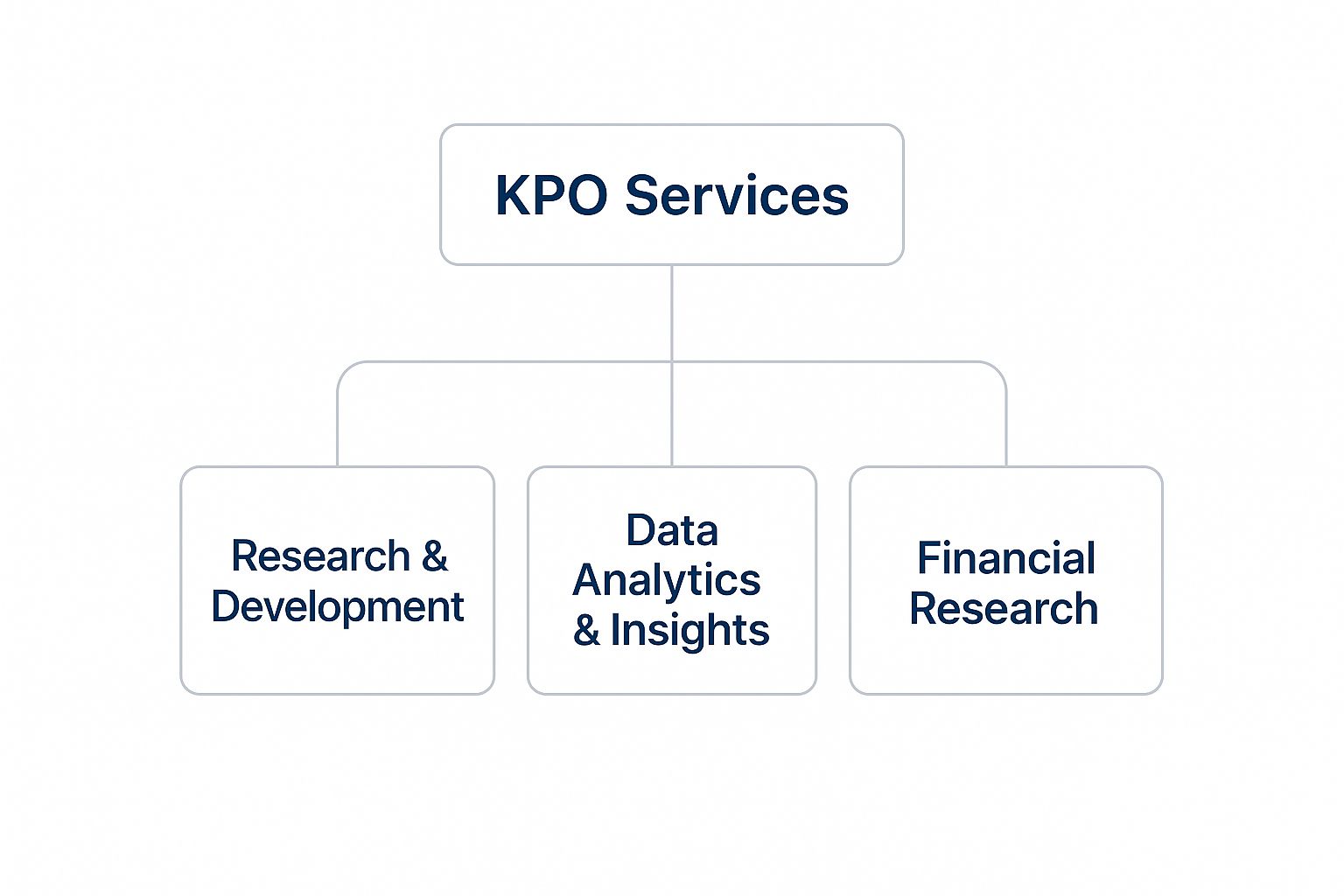When you hear the word "outsourcing," you probably think of handing off routine, process-driven tasks. But Knowledge Process Outsourcing (KPO) is a different beast altogether. It's about outsourcing high-value, knowledge-intensive work to specialised external experts.
We're not talking about simple administrative jobs here. KPO involves complex functions that demand deep industry knowledge and sharp analytical skills—think market research, financial modelling, and advanced data analytics.
Beyond the Blueprint: What KPO Truly Means

Most businesses get the basic idea of outsourcing, but KPO represents a fundamental shift. It’s moving beyond just delegating tasks to actively acquiring specialised brainpower. In short, it’s a move from doing to thinking.
Here’s a simple analogy. Traditional outsourcing, or Business Process Outsourcing (BPO), is like hiring a builder to construct a house from a detailed blueprint you’ve already created. They follow the plans precisely and get the job done efficiently.
KPO, on the other hand, is like hiring the architect. They’re the ones who research the land, analyse the housing market, design the innovative blueprint, and even recommend sustainable materials. The value isn't in following a set of instructions; it's in their judgement, interpretation, and ability to create something new from complex information.
Core Principles of KPO
At its heart, KPO is all about tapping into external expertise to manage core business functions that are data-heavy and require specialised insight. For UK businesses, this means gaining access to a global talent pool of experts who can tackle high-level analytical and knowledge-based work.
So, what are companies trying to achieve with a KPO partnership? It usually boils down to a few key goals:
- Accessing specialised skills that are either too expensive or too difficult to hire for locally.
- Generating real, actionable insights from complex data to inform critical business decisions.
- Freeing up your internal teams to concentrate on what they do best—their core responsibilities.
- Boosting operational efficiency by letting experts handle information-intensive processes.
When a company brings on a KPO partner, it’s doing more than just offloading work. It’s plugging in a team of specialists to boost its intellectual horsepower and gain a serious competitive edge.
Distinguishing KPO From Standard Outsourcing
The real differentiator is the nature of the work itself. While most outsourcing focuses on standardised, repeatable processes, KPO thrives where there's ambiguity and complexity.
A BPO customer service agent follows a script. In contrast, a KPO market research analyst has to dig into the data, spot emerging trends, and deliver a strategic report that requires expert interpretation. Grasping this distinction is key to understanding KPO's strategic value. For anyone wanting to brush up on the basics, learning more about what an outsourcing company does can build a great foundation.
This is why KPO firms are staffed with professionals holding advanced degrees and certifications in fields like finance, data science, law, and engineering. They aren't just ticking boxes; they are genuine problem-solvers. This kind of strategic partnership is about more than just saving money. It becomes a catalyst for innovation, helping businesses make smarter, more informed decisions without the huge overhead of building a large, specialised team in-house. It’s a powerful way to scale expertise on demand.
What Does KPO Actually Look Like in Practice?
When you partner with a knowledge process outsourcing (KPO) provider, you’re not just handing over tasks; you're delegating high-stakes functions to a team of specialists. This isn't about abstract strategy but about concrete, day-to-day operations that drive your business forward.
The services that fall under the KPO umbrella are incredibly varied, but they all have one thing in common: they demand serious expertise and sharp analytical thinking. These aren't simple, tick-box exercises. They're complex processes that directly shape strategic decisions and fuel growth.
This infographic gives a great overview of the main categories.

As you can see, these services branch out into distinct yet connected fields, all designed to deliver specialised intellectual value.
Let's dig into a few of the most common service areas to see how they apply in the real world.
Key KPO Services and Business Applications
To make this even clearer, here's a breakdown of common KPO services and how UK businesses might use them to get ahead.
These examples just scratch the surface, but they show how KPO is less about cost-cutting and more about accessing high-calibre talent to make smarter business decisions.
Research and Development
This is often the first port of call for businesses exploring KPO. It covers a huge range of activities aimed at gathering crucial industry and market information. The end goal is simple: provide the intelligence you need to outmanoeuvre the competition.
For example, think of that Manchester tech startup. Their KPO partner wouldn't just give them a list of competitors. They'd dive deep, analysing product roadmaps and customer reviews to pinpoint exactly where the startup could make its mark.
Common R&D services include:
- Market Research: Sizing up industry trends and customer demographics to shape your business plan.
- Competitive Intelligence: Keeping a close eye on your rivals to anticipate market shifts.
- Intellectual Property (IP) Research: Conducting patent searches to protect your innovations.
Data Analytics and Insights
We're all swimming in data these days, but turning those numbers into something useful is a real challenge. This is where KPO data analytics services shine. Using sophisticated tools and statistical know-how, these teams find the meaningful patterns buried in your data.
A UK retail brand, for instance, could bring in a KPO firm to make sense of its customer purchasing data. The firm would look beyond top-line sales figures to identify specific customer segments and buying habits, providing the insight needed for incredibly effective marketing.
The real magic of KPO-driven data analytics is its power to answer tough questions. It’s not just about what happened, but why it happened and what’s likely to happen next.
Financial Research Services
The financial sector has been a big fan of KPO for years, and it's easy to see why. The work is incredibly specialised and data-heavy, making it a perfect fit for outsourcing. KPO firms provide essential support to investment banks, asset managers, and other financial institutions.
Imagine a busy investment firm in London. A KPO partner could take on the time-consuming work of equity research—building financial models, analysing company performance, and writing in-depth reports. This allows the in-house team to focus on what they do best: managing client relationships and making final investment calls. Many firms find that exploring guides on finance and accounting outsourcing options is a brilliant way to get started.
The appetite for these specialist KPO services is growing fast in the UK as more businesses look for external expertise to sharpen their operations. It’s part of a much bigger picture: the global KPO market is projected to hit $54.7 billion by the end of 2025, which shows just how many companies are getting on board. You can discover more about top outsourcing trends on proceragroup.com.
KPO vs BPO: What’s the Strategic Difference?
On the surface, Knowledge Process Outsourcing (KPO) and Business Process Outsourcing (BPO) can look quite similar. They both involve handing off work to an external partner, but that’s where the comparison ends. The strategic thinking behind each is worlds apart, and getting this distinction right is key to building a smart outsourcing strategy.
Let’s boil it down. BPO is all about execution. KPO is all about expertise.
BPO is designed to efficiently handle routine, rule-based jobs. Think of the essential tasks that need doing but don’t require deep, specialist judgement every step of the way. In contrast, Knowledge Process Outsourcing is about bringing in external brainpower for your core, judgement-based work—the complex stuff that needs serious domain knowledge and directly shapes your company's big decisions.
The Core Philosophy: Process vs Insight
The real split between BPO and KPO is what you're asking them to achieve. A BPO provider's job is to follow a set process to perfection, driving up efficiency. A KPO partner’s job is to create new insights and add value where there isn’t a clear process to follow.
A BPO provider is the perfect fit for tasks like:
- Customer Support: Working through scripts to handle common customer questions.
- Data Entry: Inputting information accurately, following a strict set of rules.
- Payroll Processing: Making sure everyone gets paid correctly based on existing data.
These jobs are crucial, no doubt. But their value lies in consistency and accuracy, not in original thought. This focus on process has made BPO a mainstay for businesses across the United Kingdom.
In fact, the UK’s BPO market is expected to hit around $31.46 billion by 2025, largely because companies are always looking for cost-effective ways to get things done. This long-standing comfort with outsourcing routine work has opened the door for UK businesses to start thinking about outsourcing more complex, knowledge-intensive functions. You can dive deeper into the numbers by exploring the UK's outsourcing market trends on statista.com.
Where KPO Takes the Lead
KPO plays in a completely different ballpark. It deals with tasks that are analytical, interpretive, and deeply strategic. The objective isn't just to tick a box; it's to sift through information and deliver expert recommendations.
A BPO team follows the map you provide. A KPO team researches the terrain and helps you draw a better map. This shift from execution to analysis is the key strategic difference.
KPO partners take on functions that demand a high level of specialist skill—things like financial modelling, in-depth market research, or complex legal analysis. The value they bring is tied directly to the quality of their insights and their knack for solving thorny problems that don't have a simple, off-the-shelf answer.
To really see the difference, let’s put them side-by-side.
Ultimately, the choice between BPO and KPO comes down to what your business actually needs. If your goal is to make a standard process run cheaper and smoother, BPO is your answer. But if you’re looking for specialist brainpower to tackle complex data and fuel strategic growth, then knowledge process outsourcing is the way to go.
The Real-World Benefits of KPO Integration

The theory behind knowledge process outsourcing is all well and good, but what really matters are the tangible results. For UK businesses, bringing KPO into the fold isn't just a minor operational tweak—it's a strategic decision that delivers real, measurable advantages. The benefits stretch far beyond simple cost-cutting and get right to the heart of efficiency, growth, and your competitive edge.
When you work with a KPO partner, you're essentially plugging your business into an external powerhouse of intellect and skill. This kind of partnership lets you tackle high-level challenges and jump on opportunities that might otherwise be out of reach, all without the crippling overheads of building a large in-house team from the ground up.
Let's break down the specific benefits this can bring to your organisation.
Unlocking a Global Talent Pool
One of the most immediate and powerful advantages is gaining access to a worldwide reservoir of specialised talent. Just imagine needing a data scientist with niche expertise in the UK retail sector, or a financial analyst with deep experience in renewable energy investments. Finding, hiring, and keeping those professionals locally can be incredibly difficult and expensive.
Knowledge process outsourcing tears down those geographical walls. It connects you with highly qualified experts from around the world who have the exact skills your projects demand. This on-demand access means you can pull together a world-class team for a specific job without the long-term costs and commitments of permanent hires.
A growing fintech startup in London, for instance, could partner with a KPO firm to bring on a team of risk modelling experts for a six-month product launch. It's the perfect expertise at the perfect time, for a fraction of what it would cost to hire a full-time team.
By tapping into a global talent pool, you turn a local skills shortage from a business obstacle into a strategic opportunity. You are no longer limited by who you can find down the road; you can work with the best, wherever they happen to be.
Significant Cost Efficiencies
While KPO is driven by expertise, not just cost, the financial benefits are impossible to ignore. Building an in-house team of specialists involves so much more than salaries. You have to factor in recruitment fees, training, benefits, office space, and expensive software licences—it all adds up, fast.
KPO presents a much more cost-effective model. You pay for the services you need, when you need them. This turns what would be a hefty fixed overhead into a flexible operational expense. It gives you access to top-tier talent and advanced tools without the massive upfront investment. In fact, a recent analysis found businesses can realise savings of up to 70% on salary costs alone compared to local hiring.
Those savings can then be put back into other core areas of your business—like product development, marketing, or customer service—creating a powerful cycle of growth.
Enhancing Team Efficiency and Focus
Your internal team holds invaluable knowledge about your business, your customers, and your long-term goals. The problem is, they can easily get bogged down by complex, time-consuming analysis and research. These tasks are important, but they pull your best people away from their core responsibilities.
Integrating knowledge process outsourcing frees your team from these specialised burdens. When an external partner is handling the deep-dive market research or tricky financial modelling, your key people can concentrate on what they do best: driving strategy, innovating, and building client relationships. This smart division of labour leads to:
- Increased Productivity: Your team simply gets more done when they're focused on high-impact activities.
- Improved Morale: People are more engaged when their work aligns with their primary strengths and passions.
- Better Strategic Outcomes: With more time for big-picture thinking, your team can make smarter, more forward-looking decisions.
Think of it like giving your star players the support crew they need to win the game. By handing off the complex data crunching to KPO experts, you empower your internal team to focus on scoring goals and driving the business forward. That's what smart growth is all about.
How to Choose the Right KPO Partner
https://www.youtube.com/embed/skc0hCOaYFA
Picking a knowledge process outsourcing provider isn't like buying office supplies; it's about finding a genuine strategic partner. The right firm feels like an extension of your own team, bringing specialist skills that genuinely help your business grow. Get it wrong, however, and you could be facing security headaches, subpar work, and a partner that just doesn't get your vision.
So, how do you make the right call? It takes a bit of a methodical approach. You have to look past the slick sales presentations and really dig into what makes them tick—from the quality of their people to how seriously they take security. This groundwork is what builds a partnership on a solid foundation of trust, competence, and shared goals.
Evaluate Their Industry and Domain Expertise
First things first: expertise. In KPO, general knowledge just won’t cut it. You need a partner who has deep, hands-on experience in your specific field. If you’re a financial services company, you need analysts who live and breathe complex regulations. If you're a tech start-up, you need researchers who can pinpoint trends in a fast-moving niche market.
Ask any potential partner for concrete case studies and references from companies that look a lot like yours. Don't be shy about asking for the credentials of the actual team members who would be working on your account. What’s their background? What have they achieved on similar projects? This is the kind of due diligence that confirms they have the brainpower to deliver real value.
A great KPO partner doesn't just process data; they understand the context behind it. Their value comes from providing insights that are directly relevant to your industry's unique challenges and opportunities.
Scrutinise Security and Compliance Protocols
When you bring on a KPO partner, you're often handing over sensitive business data. This makes security and compliance completely non-negotiable. It’s absolutely vital to confirm that any potential provider has airtight security measures in place to protect your intellectual property and confidential information.
The graph below gives you an idea of just how big the outsourcing market is in the UK, highlighting the sheer volume of business data being handled by third-party providers.
Given the economic scale of this sector, robust security isn't a "nice-to-have"—it’s a fundamental requirement for any business trusting its processes to someone else.
Before you even think about signing a contract, ask some direct questions about their data protection framework.
- Certifications: Are they certified with internationally recognised standards like ISO 27001?
- Compliance: How do they guarantee full compliance with regulations like GDPR, especially when your customer data is involved?
- Confidentiality: What specific clauses do their contracts include to protect your non-disclosure and intellectual property rights?
A clear, confident answer to these questions is a great sign. Any hesitation or vague response should be considered a major red flag.
Assess Technology and Communication
The right technology and open lines of communication are the two pillars of any successful KPO relationship. Your partner should be using modern tools for data analysis, project management, and reporting that can easily plug into your own systems. A clunky, outdated tech stack will only create friction and slow things down.
Just as crucial is how they communicate. You need to set clear expectations right from the start about how often they'll report, who your main point of contact is, and which platforms you'll use to talk (like Slack, Teams, or email). A partner who is proactive and responsive is essential for keeping projects on track and making sure everyone is on the same page. For a deeper dive into this, our guide on selecting an outsourcing IT company has some great tips on vetting technical capabilities.
The Future of Knowledge Process Outsourcing

The world of strategic outsourcing is changing, and fast. Knowledge process outsourcing is no longer just about getting access to an expert analyst. It's maturing into a dynamic, tech-driven partnership. This shift is being shaped by a few major trends, mostly driven by huge leaps in artificial intelligence and an ever-growing need for very specific, high-level skills.
For businesses here in the UK, getting a grip on these trends is vital for building an outsourcing strategy that keeps you ahead of the game. The future of KPO isn't just about finding talent; it's about blending intelligent systems with niche expertise to forge a real competitive edge. The result? Insights that are faster, deeper, and more predictive than we've ever seen before.
The Rise of AI and Machine Learning
Let's be clear: artificial intelligence (AI) and machine learning (ML) are here to enhance what KPO experts do, not replace them. Think of it as giving your specialist a super-powered assistant. These technologies are incredible at sifting through mountains of data and spotting patterns far more quickly than any human could.
This creates a brilliant synergy. The AI does the heavy lifting—the number crunching and data processing—which frees up the human experts to do what they do best: interpret the findings, devise strategies, and solve genuinely complex problems.
This new partnership is already leading to some big steps forward:
- Predictive Analytics: AI algorithms can chew through historical data to forecast market trends, predict what customers will do next, and flag potential business risks with startling accuracy.
- Enhanced Speed: Analytical tasks that used to take days of manual work can now be done in minutes. This dramatically speeds up project timelines and lets you make decisions faster.
- Deeper Insights: Machine learning is brilliant at finding those subtle connections and hidden opportunities in your data that a human eye might easily miss.
This human-AI collaboration is turning knowledge process outsourcing into an even more powerful weapon for strategic planning.
Hyper-Specialisation for Niche Sectors
As industries get more complicated, the days of the generalist are numbered. The future of KPO is all about hyper-specialisation, where providers have incredibly deep knowledge of specific UK sectors. We're already seeing KPO firms that focus only on niche areas like fintech, renewable energy, or bioinformatics.
These specialists bring more than just sharp analytical skills to the table. They have a deep-seated understanding of an industry's specific regulatory hurdles, competitive pressures, and new technologies. For any business operating in a niche field, that kind of targeted expertise is gold dust.
The next wave of KPO is not about being a jack-of-all-trades. It’s about delivering master-level expertise in the specific fields where UK businesses need to excel, from sustainable finance to digital health.
This trend is a direct answer to a real market need. Businesses want partners who speak their language and get the small details that make all the difference. It's no surprise the global KPO market is projected to hit a massive $103.58 billion by 2032. That number alone tells you how vital these advanced capabilities are becoming. As the UK’s digital infrastructure keeps growing, KPO is perfectly placed to grow right alongside it. You can find more analysis on the UK outsourcing services market at Grand View Research.
Seamless Hybrid Models
Finally, the old, rigid line between your in-house team and your outsourced partners is blurring. The future is hybrid. KPO partners are now plugging directly into internal teams, working as one cohesive unit. This collaborative model makes sure the external expertise is perfectly aligned with your company’s culture and long-term goals.
This all works thanks to shared platforms, open lines of communication, and a true partnership mentality. It gives a business the best of both worlds: you keep control of your core strategy while plugging in the specialised skills and scalability of a KPO provider whenever you need them. The result is a far more flexible and powerful way of working.
Got Questions About KPO? We've Got Answers
Even when you see the potential, it's natural to have questions before jumping into knowledge process outsourcing. Most business leaders I talk to want to iron out the details before they commit. Think of this as a quick-fire Q&A to clear up those last few queries and help you move forward with confidence.
Often, the questions boil down to a few key areas: how KPO stacks up against other services, what happens to your sensitive data, and whether it’s just a game for the big players. Let’s get those sorted.
How Is KPO Different From Standard Consulting?
This is a great question because, on the surface, they can look similar. Both bring outside expertise into your business, but their roles and the way they work with you are fundamentally different.
A consultant is like a specialist surgeon. You call them in to diagnose a very specific problem, they recommend a course of action or perform a one-off procedure, and then they leave. It’s a short-term, project-based fix.
A KPO partner, on the other hand, is like having a specialist doctor join your permanent staff. They integrate into your team for the long haul, taking full ownership of an entire knowledge-based function. Instead of just advising, they're the ones doing the daily market analysis or managing your financial modelling day in, and day out. It's an ongoing collaboration built on execution, not just advice.
How Is My Intellectual Property Kept Safe?
Any KPO provider worth its salt knows that protecting your intellectual property (IP) is paramount. The entire relationship is built on a foundation of trust, making robust security a deal-breaker. This isn't just a handshake agreement; it's enforced with concrete legal and technical measures.
Before a single piece of data is exchanged, you'll establish a rock-solid legal framework. This typically includes:
- Non-Disclosure Agreements (NDAs): These legally bind the provider and its team to absolute confidentiality.
- Clear IP Ownership Clauses: This is crucial. The contract will state in no uncertain terms that all work, insights, and data generated belong exclusively to you.
- Service-Level Agreements (SLAs): These get into the nitty-gritty of security protocols and how your data will be handled.
When you're assessing potential partners, don't be shy. Ask to see their data security credentials, especially certifications like ISO 27001. This is the gold standard and proves they’re serious about meeting international security requirements to keep your assets safe.
Is KPO Only for Large Corporations?
Not anymore. This is probably one of the biggest myths out there. While KPO may have started as a strategy for massive enterprises, it has become an absolute game-changer for small and medium-sized enterprises (SMEs) across the UK. In many ways, SMEs have the most to gain.
Think about it. KPO gives a smaller business access to a pool of specialised talent and sophisticated analytical tools that would be financially impossible to bring in-house. It completely levels the playing field. Suddenly, you can make the same calibre of data-driven decisions as your giant competitors, but without the crippling overheads. For this reason, knowledge process outsourcing is a powerful engine for growth, no matter the size of your business.

